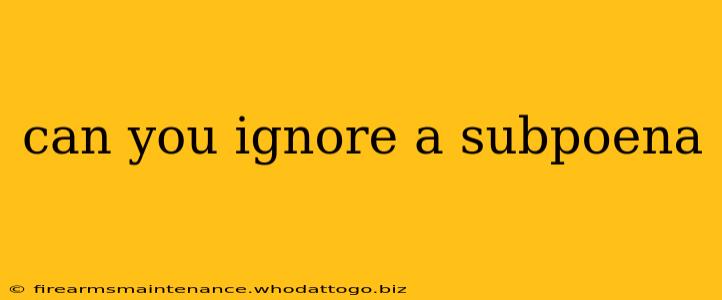Ignoring a subpoena is a serious legal matter with potentially severe consequences. While the immediate impulse might be to disregard it, understanding the ramifications is crucial before taking any action. This article explores the complexities surrounding subpoena avoidance, outlining the potential penalties and offering guidance on how to proceed legally and responsibly.
What Happens If You Ignore a Subpoena?
Ignoring a subpoena is not a viable solution. It’s a legally binding document that compels you to appear in court or produce specific documents. Failure to comply demonstrates contempt of court, which can lead to:
-
Contempt of Court Charges: This is a serious offense that can result in fines, jail time, or both. The penalties can vary greatly depending on the jurisdiction and the nature of the subpoena.
-
Civil Penalties: In civil cases, ignoring a subpoena can lead to the court entering a default judgment against you, meaning the opposing party wins the case without a trial.
-
Criminal Charges: In criminal cases, ignoring a subpoena can lead to additional criminal charges, potentially increasing the severity of your situation.
-
Damage to Your Reputation: Ignoring a legal document can significantly damage your reputation, making it difficult to obtain loans, secure employment, or participate in professional activities.
-
Further Legal Action: The court may issue an arrest warrant for your failure to appear or comply with the subpoena. This can involve the police apprehending you and bringing you before the court.
When Can You Legitimately Challenge a Subpoena?
While ignoring a subpoena is strongly discouraged, there are legitimate grounds to challenge its validity. You may have legal recourse if:
-
The Subpoena is Overbroad or Unreasonable: If the subpoena requests information or documents that are irrelevant to the case or unduly burdensome to produce, you can file a motion to quash or modify the subpoena. This involves requesting the court to limit the scope of the subpoena.
-
The Subpoena is Improperly Served: The subpoena must be served according to specific legal procedures. If the service was improper, the subpoena may be invalid.
-
The Subpoena Violates Your Privileged Information: Certain information is protected by attorney-client privilege, doctor-patient confidentiality, or other privileges. You can challenge a subpoena that seeks privileged information.
-
Lack of Jurisdiction: If the court issuing the subpoena lacks jurisdiction over you or the subject matter, you can challenge the validity of the subpoena.
What to Do If You Receive a Subpoena
If you receive a subpoena, consult with an attorney immediately. This is not a situation to handle independently. An attorney can advise you on the best course of action based on the specifics of your situation. They can:
-
Assess the Validity of the Subpoena: They will review the subpoena to determine its legal standing and identify any potential grounds for challenge.
-
Represent You in Court: If you need to appear in court, your attorney will represent you and protect your rights.
-
Negotiate with the Issuing Party: In some cases, they can negotiate with the party who issued the subpoena to modify its scope or reach a mutually agreeable resolution.
-
File Necessary Motions: They can file motions to quash or modify the subpoena if necessary.
Conclusion
Ignoring a subpoena is never advisable. The potential legal consequences are too severe. If you receive a subpoena, seeking immediate legal counsel is paramount. An attorney can provide expert advice, guide you through the legal process, and help protect your rights. Remember, proactively addressing a subpoena is far better than facing the repercussions of ignoring it. Seeking legal help is the most responsible and prudent course of action.

